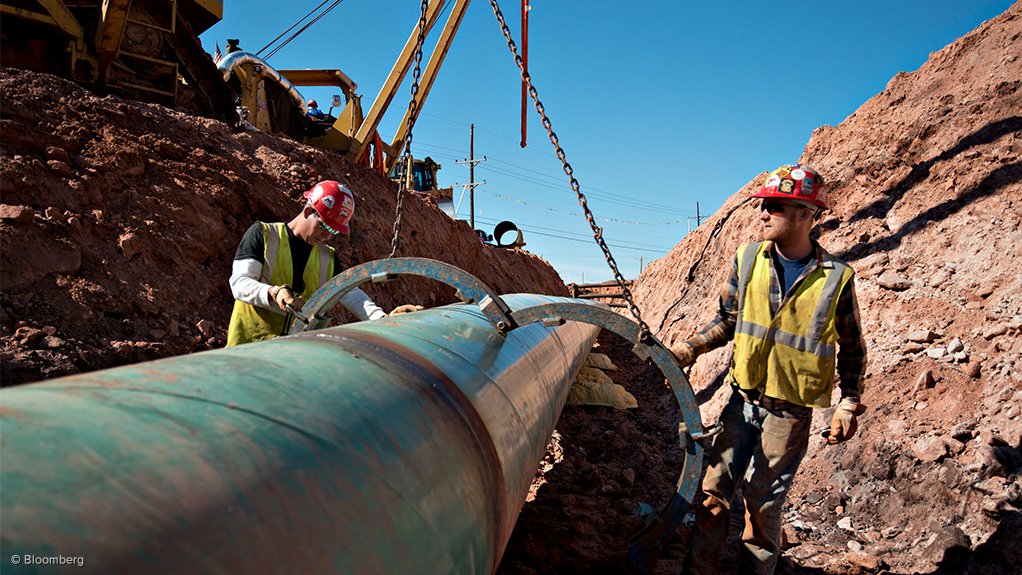VANCOUVER (miningweekly.com) – A significant disruption in the supply of gasoline, diesel and crude oil from Alberta to British Columbia would cause British Columbia “irreparable harm” and could “injure human health and safety in remote communities”, the provincial government argued in a statement of claim filed in Alberta's Court of Queen’s Bench on Tuesday.
British Columbia’s attorney general is taking his Alberta counterpart to task on the constitutionality of Alberta’s ‘Preserving Canada’s Economic Prosperity Act’, saying the hastily written Act’s main purpose is to impose a cost burden on crude oil, natural gas and refined fuels crossing the Alberta/British Columbia border and to function in a role served by tariffs to punish another province, namely British Columbia.
British Columbia is seeking a declaration that the Act is inconsistent, in whole or in part, with the Constitution of Canada and is of no force and effect.
Alberta’s Act empowers the province’s Energy Minister to require interprovincial exporters of crude oil, natural gas and refined fuels to obtain licences, which enables the Minister to restrict or otherwise interfere with or impose cost burdens on the supply of those products to British Columbia.
According to British Columbia’s attorney general David Eby, the Alberta provincial government introduced and supported the Act in retaliation against its assertion that British Columbia is responsible for delays to an expansion of Kinder Morgan’s Trans Mountain pipeline, which transports petroleum products from Edmonton to Kamloops, Burnaby and Washington.
"Alberta seeks to use powers under the Act to punish British Columbia and to exert pressure on the province with a view to forcing it to discontinue the reference case it brought before its own courts about the constitutionality of proposed amendments to the British Columbia Environmental Management Act," the statement of claim states.
British Columbia also argues that the Act is unconstitutional because it violates Section 121 of the Canadian Constitution, which provides that goods and produce between provinces are allowed to move fee free between each other.
A significant percentage of the gasoline and diesel consumed in British Columbia is imported from Alberta refineries, either by pipeline, train or tanker truck. Refined petroleum products and crude oil exported from Alberta to British Columbia by pipeline comes through the Trans Mountain Pipeline, which was built in 1953. The majority of the Burnaby-based Parkland refinery’s crude oil feedstock is imported from Alberta.
TIMELINE OF EVENTS
The legal spat escalated earlier this year when the British Columbia government announced on January 30 that it will engage in consultation on proposed legislation to improve preparedness, response and recovery from potential spills into the environment, including measures imposing restrictions on any increased volumes of diluted bitumen brought into British Columbia for refinement, use or export. The announcement essentially moved the goal posts further for Kinder Morgan and its planned C$7.4-billion project.
Alberta Premier Rachel Notley responded on February 6, by announcing via the Gaming and Liquor Commission that the province would put an end to imports of British Columbia wine products into Alberta.
On February 19, British Columbia referred the Alberta measure against British Columbia wines to a dispute process under the Canadian Free Trade Agreement.
On February 22, British Columbia Premier John Horgan revealed that he is prepared to ask British Columbia’s Cabinet to set a reference question in relation to the province’s authority to “take appropriate measures to protect our environment, economy and our coast from the drastic consequences of a diluted bitumen spill”; and to take no action to implement restrictions on diluted bitumen in British Columbia until the reference could be determined.
That same day, Notley announced that Alberta was suspending any measures against British Columbia wines.
On April 8, Kinder Morgan Canada CEO Steve Kean announced that the company was discontinuing all nonessential work on the Trans Mountain Expansion Project to increase the capacity of its existing pipeline system – that has operated with no incidents since 1953 – from about 300 000 bbl/d to 890 000 bbl/d, providing much-needed diluted bitumen transportation capacity since the existing infrastructure is operating at capacity.
Kean attributed the decision to discontinue work on the project to “uncertainty created by British Columbia”, as a result of what Kinder Morgan characterised as “opposition by the Government of British Columbia” to the project. The company has set a timeline of May 31 when it will decide to pull the plug or proceed with the pipeline development.
Just before the Alberta Act’s Third Reading, Notley stated that "Albertans, British Columbians and all Canadians should understand that if the path forward for the pipeline through British Columbia is not settled soon, I am ready and prepared to ‘turn off the taps’".
The Act was given Royal Assent on May 18.
Edited by: Creamer Media Reporter
EMAIL THIS ARTICLE SAVE THIS ARTICLE
ARTICLE ENQUIRY
To subscribe email subscriptions@creamermedia.co.za or click here
To advertise email advertising@creamermedia.co.za or click here













